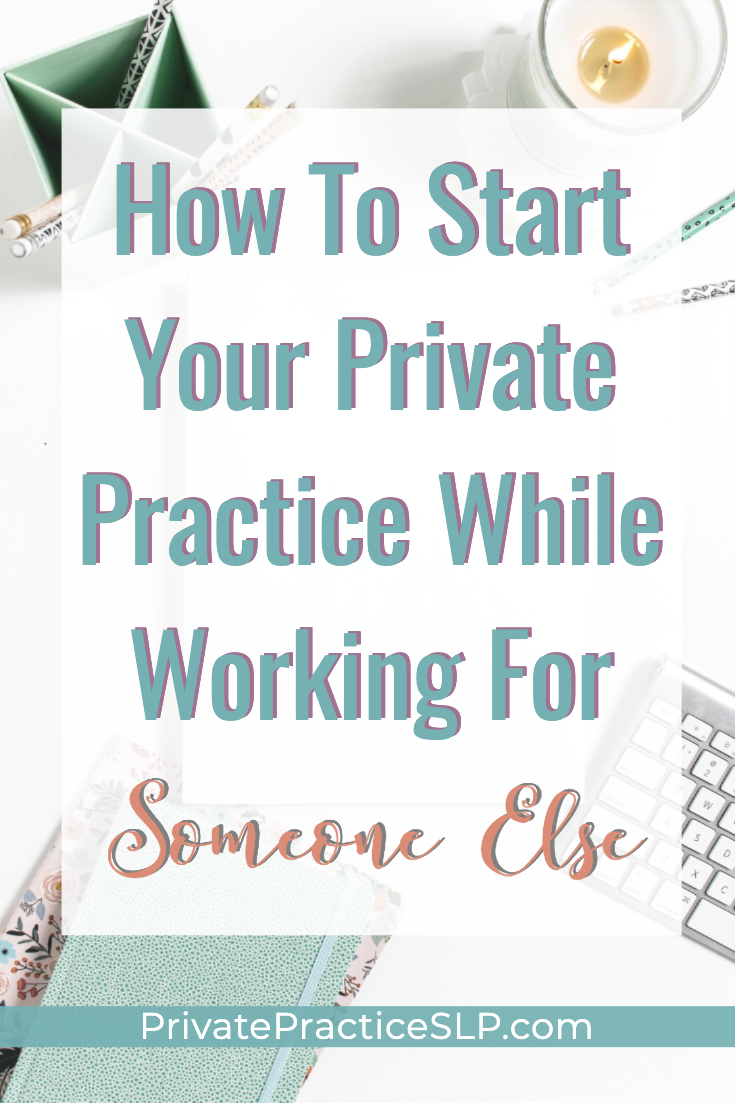Here's How to Start a Private Practice While Working For Someone Else
Chances are, when you start your private SLP practice, you will still be working for someone else (be that a school, private clinic, hospital, or long-term care facility). We all know that workplace politics can be sticky, and you don't want to alienate your current boss while trying to make a name for yourself. Here's my guide to seeing private clients while still employed elsewhere.
1. Re-read your contract. This is the first thing you need to do when you are starting your own practice, regardless of work setting. Check for any non compete clauses; they will look something like
““You agree that at no time during the term of your employment with X will you engage in any business activity which is competitive with the Company nor work for any company which competes with X.
For a period of X time [usually 1-5 years] following the termination of your employment, you will not, for yourself or on behalf of any other person or business enterprise, engage in any business activity which competes with X within X miles of the facility in which you were employed.””
Also look for non-solicitation clauses- they will look something like this:
“During the term of your employment, and for a period of X time [usually 1 year] immediately thereafter, you agree not to solicit any employee or independent contractor of X company on behalf of any other business or enterprise, nor will you induce any employee or independent contractor associated with X company to terminate or breach an employment, contractual or other relationship with X company.
You shall not call on, solicit, take away, or attempt to call on, solicit, or take away any customer of X company with whom you became acquainted during the term of your employment with X Company. ”
Non-solicitation clauses can cover both employees (so you can't take all your work friends with you to your new practice) and clients.
Both non-compete and non-solicitation clauses are common, but non-compete clauses can be more difficult for employers to enforce, especially if you are an independent contractor and not an employee of your current company. In fact, some states like California refuse to enforce those clauses in order to support economic growth. However, other states like Missouri and Kansas will enforce those clauses. More info on specific enforceability here.
If your contract has either of these clauses, don't despair!
2. Talk about options with your boss- for example, if you work for a setting that sees adults, you can share how you will be working with pediatrics and won’t be a competitor for their specific client base. If you live far away from your current employment, highlight how you will be seeing clients outside of their service area.
Keep this in mind: your boss is a business owner just like you want to be. Think about how you would feel in their position- if your employee came to you and wanted to start their own business that was direct competition to yours.
Regardless of the legalese, you want to make sure you don't burn any bridges with your current job. It will be better for your private practice and everyone in the long run if you can amicably split with your current employer- and even refer to each other later!
3. Read the ASHA information on ethics in private practice.
This ASHA article on the ethics of obtaining clients from your primary employment is a great place to start- it has case studies for school, private clinic, hospital, and long-term care settings.
If you work in the schools, rather than for a private company, the area is a little less gray. That article has great information on whether or not you can see clients privately if you also provide services for them at school (remember to still check your contract). Basically, you have to be sure that the parents (or whomever is choosing the private therapy) is well-informed about the differences between private and school therapy, and about the cost. At some point in your private practice startup, you will need to tell your current employer about your new practice. It's up to you if you want to tell them before or after you resign, although in some cases, your hand may be forced.
For example, if you are working in a medical facility, you'll be billing under your NPI number. If you start seeing private clients, either private pay or with insurance, you will be providing that same NPI number on clients' superbills or claims, along with your new private practice NPI - if you chose to create an LLC or other company that requires a Type-2 NPI. (Not sure what an NPI is or how to get it? I walk you through that here. ) There could be confusion at the insurance company when they see your NPI billing at two different facilities, and you don't want a mixup to be the way your current employer finds out you're seeing clients on the side.
The best way to handle that situation is to be up front and tell your employer as soon as you feel comfortable doing so. Yes, some employers can be difficult, and sometimes even unreasonable, but for your own personal and legal sake, you want to let them know if they might be seeing your name on your own business soon.
Those are my top tips for starting a private practice when you’re currently employed. Do you have any tips about seeing private clients while working in another setting to share? Tell me in the comments!
My Private Practice Foundations course from Northern Speech Services is a one-stop guide to starting your private practice, including an entire section on the legalities of starting a practice while employed elsewhere. If you want to go at your own pace, my Private Practice Handbook (collaboration with Hannah Boeck) is another option!






